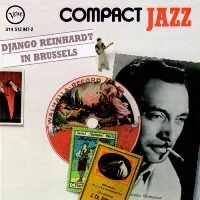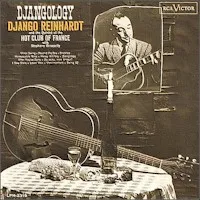Year: 2024
Time: 60:03
File: MP3 @ 320K/s
Size: 139,5 MB
Art: Front
(4:04) 1. Douce Ambiance
(5:18) 2. Nuages
(5:29) 3. Swing 39
(3:03) 4. Dinette
(5:21) 5. Rêverie
(5:33) 6. Caravan
(3:28) 7. Troublant Boléro
(4:08) 8. Porto Cabello
(3:15) 9. Swing 42
(5:06) 10. Insensiblement
(4:39) 11. Sweet Chorus
(3:31) 12. Lady Be Good
(5:02) 13. Fleur D'ennui
(1:59) 14. Brick Top
Tatiana Eva-Marie Returns with a New Project Celebrating Guitarist Django Reinhardt, the Inventor of Gypsy Jazz.
Tatiana Eva-Marie emanates creativity her vintage flair, tousled locks and enchanting vocals are evidence enough. The Swiss-born singer grew up surrounded by creatives from musicians to painters and poets. Her career is wonderfully rich in color – and the self-professed ‘6-hour sleeper’ has certainly been busy. Four album releases, performances including the Lincoln Center, Birdland and New Orleans Jazz Festival, librettist for the composer, Gérard Massini’s opera, editor-in-chief for Shrine and Vents Magazine… and that’s only skimming the surface. We’re chatting about the new and upcoming projects swirling in the energetic and eclectic world of Tatiana Eva-Marie.
Aptly nicknamed the ‘The Gypsy-jazz Warbler’, by The New York Times no less, Tatiana is most recently celebrating her gypsy jazz origins with the new music release, ‘Djangology’. The song pays homage to the legendary music of Django Reinhardt, the jazz pioneering Romani-French guitarist and composer. Inspired by Django’s musical legacy but uncertain of how she fit in as a singer amidst a sea of jazz guitarists, Tatiana boldly decided “to write (her) own lyrics, tell (her) own stories and reinvent his music in (her) own image.” The project sees Tatiana share insights into her nomadic life with humor and poetic authenticity. Alongside her band, ‘The Avalon Jazz Band’, Tatiana explores Gypsy jazz through original lyrics and musical arrangements and Djangology is only the beginning. The creative spark is set to evolve into an album and series of tours in 2023 and beyond so keep an eye out!
Tatiana’s adoration for jazz music and the Parisian art scene era was an unmistakable match made in heaven for another of her recent creative collaborations - Gérome Barry’s film, ‘Swing Rendez-Vous’. Set for release in January 2023, Swing Rendez-Vous weaves a tale of love, music and community infused with the quintessential blues and swing of jazz music. Tatiana fittingly served as inspiration for the story and plays the leading female role in the film. The feel-good musical comedy is the ideal start to what is sure to be a jazz-packed year ahead for Tatiana.
https://www.culturedfocusmagazine.com/single-post/tatiana-eva-marie-reignites-gypsy-jazz-with-new-music-djangology
Tatiana Eva-Marie emanates creativity her vintage flair, tousled locks and enchanting vocals are evidence enough. The Swiss-born singer grew up surrounded by creatives from musicians to painters and poets. Her career is wonderfully rich in color – and the self-professed ‘6-hour sleeper’ has certainly been busy. Four album releases, performances including the Lincoln Center, Birdland and New Orleans Jazz Festival, librettist for the composer, Gérard Massini’s opera, editor-in-chief for Shrine and Vents Magazine… and that’s only skimming the surface. We’re chatting about the new and upcoming projects swirling in the energetic and eclectic world of Tatiana Eva-Marie.
Aptly nicknamed the ‘The Gypsy-jazz Warbler’, by The New York Times no less, Tatiana is most recently celebrating her gypsy jazz origins with the new music release, ‘Djangology’. The song pays homage to the legendary music of Django Reinhardt, the jazz pioneering Romani-French guitarist and composer. Inspired by Django’s musical legacy but uncertain of how she fit in as a singer amidst a sea of jazz guitarists, Tatiana boldly decided “to write (her) own lyrics, tell (her) own stories and reinvent his music in (her) own image.” The project sees Tatiana share insights into her nomadic life with humor and poetic authenticity. Alongside her band, ‘The Avalon Jazz Band’, Tatiana explores Gypsy jazz through original lyrics and musical arrangements and Djangology is only the beginning. The creative spark is set to evolve into an album and series of tours in 2023 and beyond so keep an eye out!
Tatiana’s adoration for jazz music and the Parisian art scene era was an unmistakable match made in heaven for another of her recent creative collaborations - Gérome Barry’s film, ‘Swing Rendez-Vous’. Set for release in January 2023, Swing Rendez-Vous weaves a tale of love, music and community infused with the quintessential blues and swing of jazz music. Tatiana fittingly served as inspiration for the story and plays the leading female role in the film. The feel-good musical comedy is the ideal start to what is sure to be a jazz-packed year ahead for Tatiana.
https://www.culturedfocusmagazine.com/single-post/tatiana-eva-marie-reignites-gypsy-jazz-with-new-music-djangology
Djangology
















